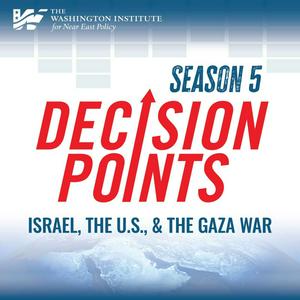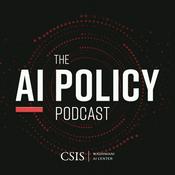65 episodes

Israel into 2025: Building on Regional Successes, Avoiding Domestic Fractures
23/12/2024 | 46 mins.
Israeli society has been through the gambit of emotions in 2024: from the national trauma of the aftermath of October 7th and repeated failed hostage negotiations, to major military achievements that have shifted the regional security landscape. As the nation looks ahead to 2025, healing internal divisions within Israel remains elusive despite the major moves to restore regional deterrence during the second half of 2024.Profound internal divisions abound. Much of the Israeli public sees the government as maneuvering to avoid a national Commission of Inquiry to investigate the failures of October 7th. At the same time, the looming prospect of permanent exemption of the ultra-orthodox from the military draft is widely unpopular, and the government’s approach to hostage negotiations has sparked widespread dissent and mass protests. Taken together, it seems that if this government fails, it will not be due to external threats, but rather because of internal divisions on these key domestic issues. How will tensions between the Trump administration’s desire to end the war and the Israeli right’s push to remain in Gaza indefinitely play out? How much the public react to a partial hostage deal that may be close at hand? How are domestic political controversies influencing Israel’s geopolitical strategy and do they impact the durability of the current coalition? And what role – if any – does Netanyahu’s ongoing trial play in this critical moment?In this episode of Decision Points, David Makovsky is joined by Yossi Klein Halevi. Yossi is a veteran keen observer of Israeli society and is a Senior Fellow at the Shalom Hartman Institute in Jerusalem. He is the author of several acclaimed books on the conflict, including the New York Times bestseller Letters to My Palestinian Neighbor, and co-host of the Institute’s podcast, For Heaven’s Sake. Together, they discuss the challenges of restoring regional deterrence while striving for internal cohesion as Israel enters 2025. Hosted on Acast. See acast.com/privacy for more information.

After Assad: Navigating Syria's Power Vacuum and Regional Fallout
16/12/2024 | 1h 3 mins.
After just a few days of fighting, Bashar al-Assad's regime has fallen, and Assad has fled to Russia. However, the collapse of the Assad regime is far from a fairytale ending. The rebels responsible for toppling Assad, Hayat Tahrir al-Sham (HTS), are designated as a terrorist organization by the United States, and history shows that power vacuums in the Middle East often lead to prolonged instability and conflict.HTS currently holds a dominant position, but Syria’s balance of power remains precarious. Competing factions are poised to challenge HTS, creating a volatile security landscape. Meanwhile, the fall of the Assad regime has significant implications for Israel. Syria has been a critical component of Iran’s axis, serving as a conduit for weapons and illicit materials to reach the West Bank and Jordan.At this critical juncture, the future of Syria hangs in the balance. How much influence will Russia, Turkey, and Iran exert in shaping Syria’s trajectory? Who will ultimately fill the power vacuum? And what role will the U.S. and Israel play in this tense and rapidly evolving environment?In this episode of Decision Points, David Makovsky is joined by Andrew Tabler and Tamir Hayman. Andrew Tabler, a senior fellow at the Washington Institute, previously served as Senior Advisor to the Special Envoy for Syria Engagement at the State Department and as Director for Syria Affairs at the White House National Security Council. Tamir Hayman, the current Director of INSS—Israel’s leading national security think tank—served as Head of IDF Intelligence, focusing on Iranian entrenchment in Syria, and previously led efforts to provide humanitarian assistance in southern Syria. Hosted on Acast. See acast.com/privacy for more information.

Inside the Middle East: How War, Ceasefires, and Trump’s Arrival Are Reshaping the Middle East
09/12/2024 | 52 mins.
The past few weeks in the region have been some of the most eventful in recent history. Hizbullah, the crown jewel of Iran’s proxy network, has suffered a devastating blow, Iran’s air defense systems have been dismantled, and a fragile ceasefire between Israel and Lebanon has been established. At the same time, the election of President Trump has introduced an entirely new level of unpredictability, sending shockwaves throughout the region.How is the war reshaping perceptions within the Middle East, particularly regarding the Israel-Lebanon ceasefire? How does the concept of Iran’s “ring of fire” hold up in this new reality? What does Saudi Arabia’s approach to normalization with Israel mean for its leadership and the future of Gaza? And how are these shifting dynamics influenced by the Trump administration?On this episode of Decision Points, David Makovsky is joined by Bernard Haykel, a leading authority on Middle Eastern politics, religion, and society, and someone who has spent more time with Saudi Crown Prince Muhammad bin Salman (MBS) than perhaps any American over the last decade. Bernard will soon be releasing his book on MBS, and as a scholar with a personal connection to the region—having grown up during Lebanon’s civil war—he brings a unique insider perspective on the Middle East’s complexities. Hosted on Acast. See acast.com/privacy for more information.

Will the Israel-Lebanon Ceasefire Hold?
02/12/2024 | 40 mins.
After more than a year of intense fighting between Israel and Hezbollah, President Biden recently announced a ceasefire, raising hopes that this agreement could save lives, restore stability, and bring an end to the unprecedented escalation that began with the October 7 attacks. But how did this ceasefire come about, and how does it compare to the conclusion of the 2006 war in Lebanon?Israeli Prime Minister Benjamin Netanyahu has claimed that Hezbollah has been set back by decades due to the Israeli military’s strikes. Is this an accurate assessment? What role have external players—like the U.S. and Iran—played in shaping this outcome, and could this moment signal a shift in Iran’s regional calculus?Perhaps most importantly, does this ceasefire mark a new phase in Israel’s broader security strategy in the region? To help unpack these critical questions, David Makovsky is joined by Amos Harel, one of Israel’s leading military analysts and a senior correspondent for Haaretz. Amos has extensively covered Israel’s northern front and is a keen observer of the country’s military strategies and security leadership. Hosted on Acast. See acast.com/privacy for more information.

Israel and Iran Tensions: Calculating Risk Amid Conflict
11/11/2024 | 52 mins.
Since October 1st, tensions between Israel and Iran have reached new heights. In recent weeks, we’ve seen significant Israeli strikes on Iranian targets and a weakening of Iran’s proxy network. At the same time, Israel is stretched across multiple active fronts, challenging its traditional military doctrine of short, decisive wars and increasing its reliance on U.S. resupply. With Iran reeling from the damage and Israel adopting a bold defensive posture, the coming weeks are set to be critical.As the balance of power shifts, the risk of a broader conflict grows. How might Israel respond to direct Iranian retaliation, and what could this mean for its approach to Iran’s nuclear infrastructure? Could the conflict evolve into a war of attrition, or will Israel use its momentum to push for decisive action? To explore these questions, David Makovsky is joined by two experts: Karim Sadjadpour, a senior fellow at the Carnegie Endowment for International Peace specializing in Iran and U.S. policy in the Middle East, and Assaf Orion, the Liz and Mony Rueven International Fellow at The Washington Institute and a retired Israeli brigadier general and defense strategist. Hosted on Acast. See acast.com/privacy for more information.
More Government podcasts
Trending Government podcasts
About Decision Points
Listen to Decision Points, Strict Scrutiny and many other podcasts from around the world with the radio.net app

Get the free radio.net app
- Stations and podcasts to bookmark
- Stream via Wi-Fi or Bluetooth
- Supports Carplay & Android Auto
- Many other app features
Get the free radio.net app
- Stations and podcasts to bookmark
- Stream via Wi-Fi or Bluetooth
- Supports Carplay & Android Auto
- Many other app features


Decision Points
download the app,
start listening.























